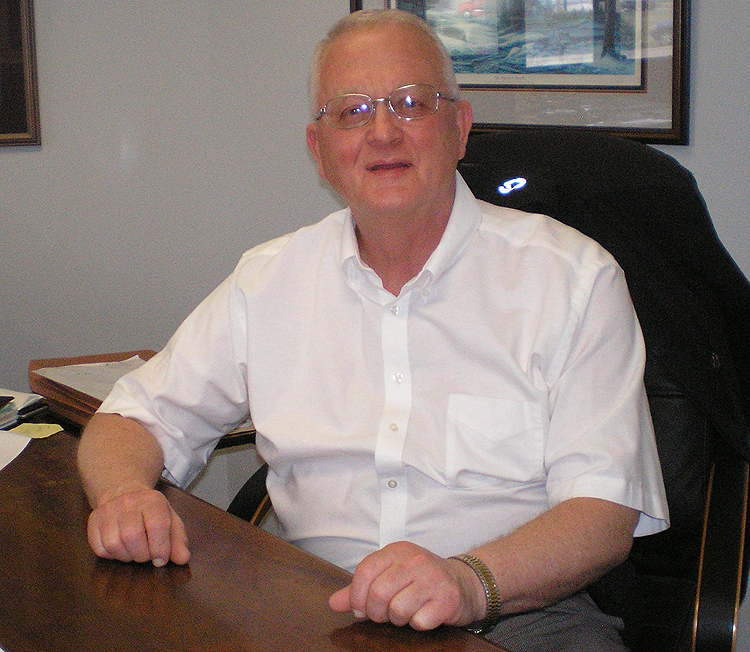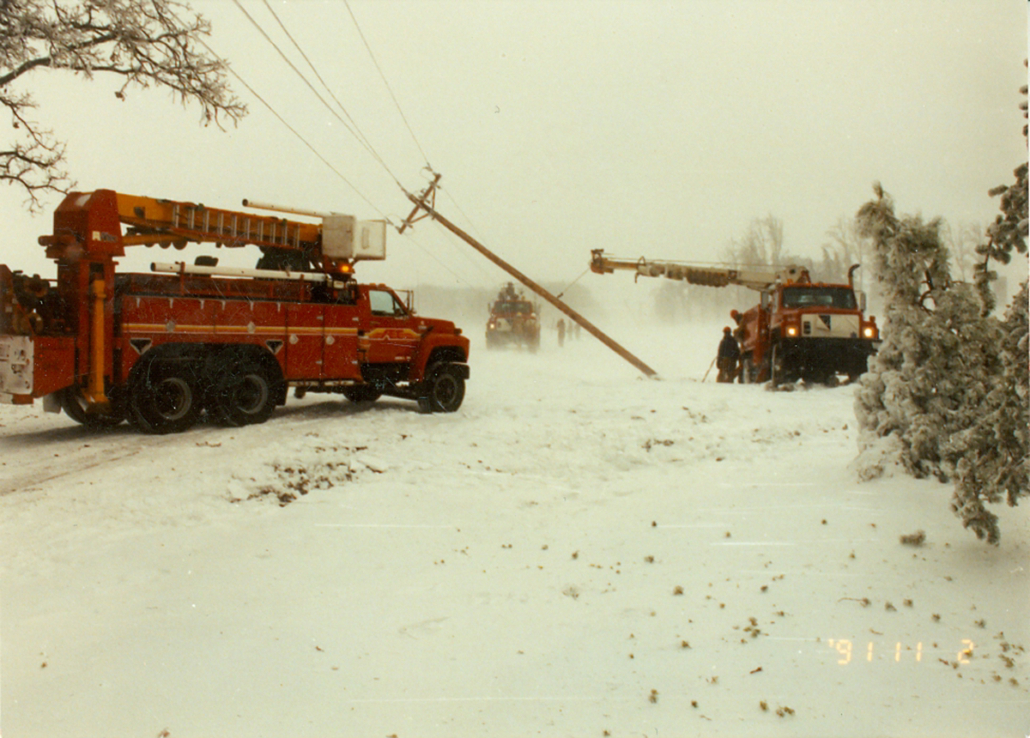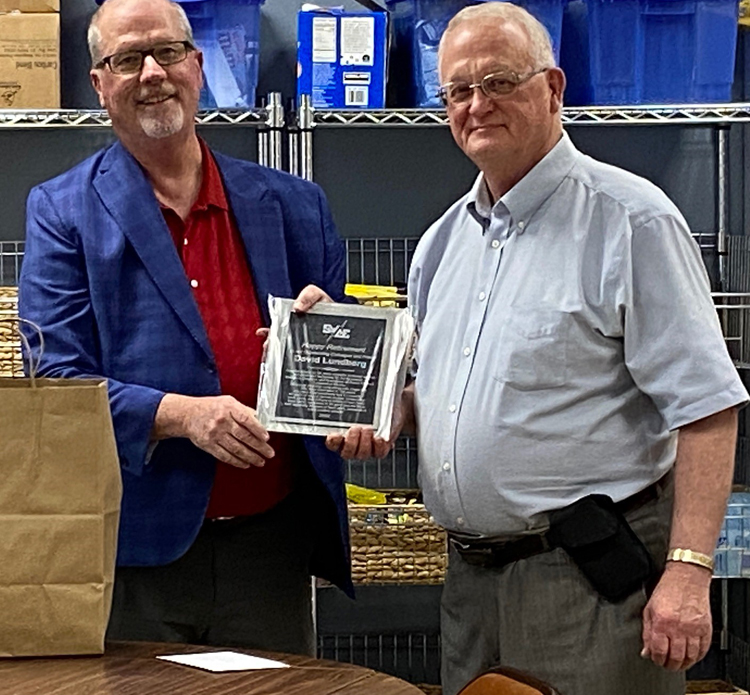Lundberg retires after 49 years with Steele-Waseca Cooperative Electric

Division Manager Dave Lundberg formally
retired Thursday, June 30, after a 49-year
career with the co-op.
Steele-Waseca Cooperative Electric Finance Division Manager Dave Lundberg retired Thursday, June 30, following a 49-year career with the co-op.
“I’m 70 and it’s time to pass the baton on,” said Dave.
Lundberg joined Steele-Waseca on June 1, 1973, as an accountant after being recruited while attending Willmar Technical Institute. “I was recruited—yes,” said Dave. “They drove up to Willmar,” referring to Steele-Waseca General Manager Don Larson and Accountant Stan Larson, based on the school’s reputation of having a quality accounting program.
Dave recalled the school’s placement director asked him if he wanted to interview for the position as the director said it looked like a “pretty good job opening.” “I think they interviewed 10 students,” said Dave, who recalled going to a second interview at Steele-Waseca, and interviewing for another position in Bloomington, before deciding Steele-Waseca was a better opportunity. In addition, Dave also had an emphasis on finance and previously attended Moorhead State University, and completed the USDA/REA accounting course.
During his years at Steele-Waseca, Dave was promoted to staff accountant in June 1979, and business analyst in January 1980, before being promoted to finance division manager. His early years worked in the areas of capital credit equity and plant accounting.
“Overall, I think one of the nice things we’ve been able to do is hold the line on retail rates,” said Dave, noting legacy members have not had a rate change since 2013.
Lundberg credited the REA and later RUS loan program with keeping interest rates low for rural electric cooperatives like Steele-Waseca. “This turned out to be very beneficial to you the members,” said Dave. “It’s now called RUS, Rural Utilities Service. Low-interest loans to rural electric cooperative customers for capital expenditures and it helps keep the retail rates down,” whether for constructing or rebuilding power lines, poles, substations, installing meters, and transformers, etc.
“I like the business model,” said Dave referring to cooperatives. Noting after expenses are subtracted from revenues, the excess goes to the members in capital credit equity. “It’s a good honest form of business,” said Dave, with yearly audits and pride with his years of clean audits. “You’ve got a good board, good employees, and everybody works together,” said Dave referencing his view of the efficient operation at Steele-Waseca.
Prior to 1991, Lundberg said he didn’t have experience with FEMA (Federal Emergency Management Agency), but that would change following the Halloween ice storm in 1991. Dave reflected on how General Manager Don Larson directed him to go into a room and try to figure how Steele-Waseca was going to pay for the immense line, pole, and other structural damage sustained by the co-op as a result of the storm. Dave recalled his phone calls for federal assistance, and correspondence with Minnesota’s U.S. Senators Dave Durenberger and Rudy Boschwitz, along with the Minnesota Rural Electric Association.
“We may have been the first co-op in Minnesota,” said Dave to utilize FEMA to pay for equipment damage from a storm. He recalled Steele-Waseca received just over $3 million in aid from FEMA to replace 5,000 poles in about a five-year period. “Some of our customers were out of power for two weeks,” said Dave as a result of the Halloween storm in 1991. He also noted between the rebuilding and going through a FEMA audit, it took about 10 years for the co-op to work through the paperwork process.
Even though Steele-Waseca has utilized FEMA for damages sustained from storms since that time, Lundberg maintains nothing comes close to what Steele-Waseca experienced from that ice storm in 1991. Dave added his experience with FEMA had him as a contact on their website, “I was getting calls all over the country from people that wanted to know how to start, how they applied for aid,” said Dave. “I did help lay the foundation for the future for other co-ops.”
The other major experience for Steele-Waseca during Dave’s career was the land purchase and construction of the co-op’s present headquarters on West Bridge Street, which broke ground in August 1993. Lundberg said the co-op learned from the Halloween ice storm that Steele-Waseca was landlocked in downtown Owatonna. He noted the present headquarters is a good location for Steele-Waseca in getting trucks in and out, and offers expansion opportunities if needed in the future.
Lundberg praised Steele-Waseca’s board of directors for maintaining the co-op’s scholarship program. “It’s important especially in today’s technical world that kids, if they want to be successful in today’s employment, they need to get some kind of training,” said Dave, regardless if it’s from a 1-,2- or 4-year program. “We need people to fix our furnaces, air conditioners, computers, we need mechanics, carpenters, electricians, plumbers, linemen, farmers—all kinds of technical people.”
Dave was recognized at Steele-Waseca’s 86th annual meeting, Tuesday, June 7, for working at his 50th annual meeting. He noted the recognition “felt good,” recalling, “Is anybody here been here 50 years or longer and nobody raised their hand,” said Dave.
Dave and his wife, Deb, plan to maintain residence in Owatonna as they together enjoy retirement. “I plan on doing some traveling, attend sporting events, and have two brothers with boats, so do a little fishing.” The couple has an adult son working and living in the Washington, D.C. area.
“I have gotten to know many members and have appreciated working for a rural electric cooperative tied to agriculture and the businesses too,” said Dave.
Steele-Waseca wishes to thank Dave for his dedicated service to the cooperative for 49 years, and to enjoy the opportunities ahead during his retirement.



LIFE+
#swceLIFE+





